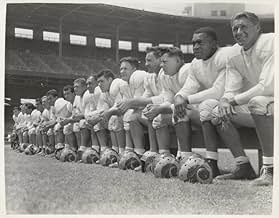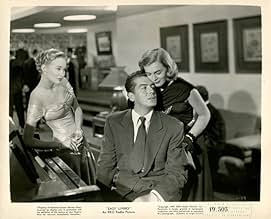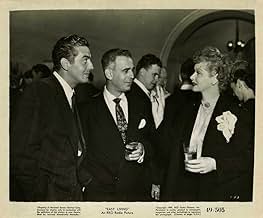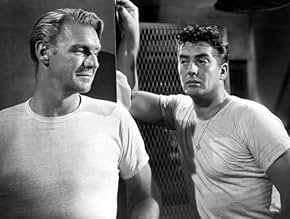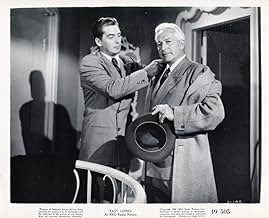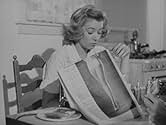IMDb RATING
6.3/10
1.1K
YOUR RATING
Star footballer Pete Wilson faces a career-threatening condition. His wife Liza enjoys the glamorous lifestyle, while shunning has-beens. His friend Tim retired to coach. Pete only knows foo... Read allStar footballer Pete Wilson faces a career-threatening condition. His wife Liza enjoys the glamorous lifestyle, while shunning has-beens. His friend Tim retired to coach. Pete only knows football.Star footballer Pete Wilson faces a career-threatening condition. His wife Liza enjoys the glamorous lifestyle, while shunning has-beens. His friend Tim retired to coach. Pete only knows football.
Richard Erdman
- Buddy Morgan
- (as Dick Erdman)
Jim Backus
- Dr. Franklin
- (as James Backus)
- Director
- Writers
- All cast & crew
- Production, box office & more at IMDbPro
6.31K
1
2
3
4
5
6
7
8
9
10
Featured reviews
Not So Easy Living
Pete Wilson, also known as King Football, faces a dual crisis. Diagnosed with a serious heart ailment, he learns his career is over. Wilson also must break the news to his star-struck wife, who enjoys the spotlight even more than he does.
"Easy Living" is of course an ironic title. Wilson's life, as a quarterback and as a husband, is anything but easy. As the story evolves, he must come to terms with both the loss of his livelihood and the possible end of his marriage. Victor Mature, who played gladiators both ancient and modern, does his best but he isn't quite up to the emotional demands of the role. And Lizabeth Scott, ever the ice princess, never comes across as Wilson's wife. The supporting cast, featuring Lloyd Nolan as the head coach and Lucille Ball as his son's widow, is generally stronger. Jack Paar, in one of his rare film roles, pops up as the team's PR man.
The film's climax, in which Wilson slaps his wife in desperation, could never be made today but still was acceptable in 1949. Frankly though, you can't help share Wilson's frustration with this frivolous woman and you have to wonder what you would do in his place.
Highly recommended, both as a study of mid-century social attitudes and for an early Hollywood view of the NFL
"Easy Living" is of course an ironic title. Wilson's life, as a quarterback and as a husband, is anything but easy. As the story evolves, he must come to terms with both the loss of his livelihood and the possible end of his marriage. Victor Mature, who played gladiators both ancient and modern, does his best but he isn't quite up to the emotional demands of the role. And Lizabeth Scott, ever the ice princess, never comes across as Wilson's wife. The supporting cast, featuring Lloyd Nolan as the head coach and Lucille Ball as his son's widow, is generally stronger. Jack Paar, in one of his rare film roles, pops up as the team's PR man.
The film's climax, in which Wilson slaps his wife in desperation, could never be made today but still was acceptable in 1949. Frankly though, you can't help share Wilson's frustration with this frivolous woman and you have to wonder what you would do in his place.
Highly recommended, both as a study of mid-century social attitudes and for an early Hollywood view of the NFL
Overlooked
1949 sleeper from RKO. At that early date pro football was still in its infancy. Thus a movie dealing with the subject must have seemed like a piece of exotica and I doubt the production made any money. Sixty years later, however, the Charles Schnee script and Jaques Tourneur direction stand as a perceptive glimpse into pro-sports at the high end, as valid now as then and definitely ahead of its time.
Star quarterback Victor Mature is a regular guy, but is drawn into the fast lane by ambitious wife Liz Scott. She's all glamor and ego, eager to hang on to her headline husband. The scenes of urban highlife and sophistication are particularly well done-- the penthouses and sleekly groomed sharks swimming around eyeing new prey. Vic's uncomfortable and senses glamorous snares, but Liz sees only social climbing opportunity, while souless, silver fox Art Baker is only too happy to oblige. In a word she strays.
On the other hand, good guy Sonny Tufts (in a tailor made part) and salt-of-the-earth wife Jeff Donnell represent the other side of Mature-- his down-to-earth side. He's drawn in both directions, and it's this conflict that sets the dramatic stage. Will he hang on to Liz and the easy life or settle for a meagre coaching job with pal Tufts. He'll have to decide because the old ticker has become a problem. In short, he's facing a crisis of values.
One scene really worth noting. The team has cut journeyman lineman Gordon Jones. He's the kind of player who eats dirt every week so the quarterback can look good. Behind him are a thousand more grunts waiting to take his place. Now he wants a piece of a tavern and a place to hang his jersey and maybe a little dignity for all the pain. Watch his quick, knowing reactions to the snobbish Liz as she ignores this "loser". What a great line when he refuses the ride next to her, saying, "The subway's good enough for me". It's a whole little morality play summed up in a few seconds.
Unfortunately the film shows its period with an unsatisfactory Hollywood ending consistent with the conventions of the day, and enough to make modern-day feminists apoplectic. Then too, the Lucille Ball role seems overdrawn and unnecessary. Nonetheless, the supporting cast is outstanding, blending easily into a smoothly executed production that again demonstrates the industry's polished level of professionalism. Definitely deserves a second look.
Star quarterback Victor Mature is a regular guy, but is drawn into the fast lane by ambitious wife Liz Scott. She's all glamor and ego, eager to hang on to her headline husband. The scenes of urban highlife and sophistication are particularly well done-- the penthouses and sleekly groomed sharks swimming around eyeing new prey. Vic's uncomfortable and senses glamorous snares, but Liz sees only social climbing opportunity, while souless, silver fox Art Baker is only too happy to oblige. In a word she strays.
On the other hand, good guy Sonny Tufts (in a tailor made part) and salt-of-the-earth wife Jeff Donnell represent the other side of Mature-- his down-to-earth side. He's drawn in both directions, and it's this conflict that sets the dramatic stage. Will he hang on to Liz and the easy life or settle for a meagre coaching job with pal Tufts. He'll have to decide because the old ticker has become a problem. In short, he's facing a crisis of values.
One scene really worth noting. The team has cut journeyman lineman Gordon Jones. He's the kind of player who eats dirt every week so the quarterback can look good. Behind him are a thousand more grunts waiting to take his place. Now he wants a piece of a tavern and a place to hang his jersey and maybe a little dignity for all the pain. Watch his quick, knowing reactions to the snobbish Liz as she ignores this "loser". What a great line when he refuses the ride next to her, saying, "The subway's good enough for me". It's a whole little morality play summed up in a few seconds.
Unfortunately the film shows its period with an unsatisfactory Hollywood ending consistent with the conventions of the day, and enough to make modern-day feminists apoplectic. Then too, the Lucille Ball role seems overdrawn and unnecessary. Nonetheless, the supporting cast is outstanding, blending easily into a smoothly executed production that again demonstrates the industry's polished level of professionalism. Definitely deserves a second look.
Realistic Drama When Football Was Still a Sport.
EASY LIVING takes you back to major league football circa 1949 and focuses on a star performer just before and after his career tops out. The direction is first rate and all the actors deliver top performances --- particularly Victor Mature, Lizabeth Scott, Lloyd Nolan and Lucille Ball. Lucy didn't always play comedy; no comedy in this one. On location filming --- a common asset to RKO Radio pictures --- adds a lot to this one. This Irwin Shaw drama doesn't have much football in it, but instead focuses on the lives of the people involved in sports.
First seen in 1949 at age 11, I looked for it again at Video Vault. It was issued in VHS so you can buy it or rent it if you look. Incidentally, RKO pictures weren't usually big hits 50 years ago but are sought after these days for their grit and on location filming. Savvy sellers in eBay include RKO in their headline.
Final comment: Unlike 2007's major hits like Pirates #3 and Potter #5, this film has an actual story, beginning, middle, end ---not relying on an overpowering musical score to sugarcoat junk. It's apt to appeal to grown-ups --- actually 11 and up.
First seen in 1949 at age 11, I looked for it again at Video Vault. It was issued in VHS so you can buy it or rent it if you look. Incidentally, RKO pictures weren't usually big hits 50 years ago but are sought after these days for their grit and on location filming. Savvy sellers in eBay include RKO in their headline.
Final comment: Unlike 2007's major hits like Pirates #3 and Potter #5, this film has an actual story, beginning, middle, end ---not relying on an overpowering musical score to sugarcoat junk. It's apt to appeal to grown-ups --- actually 11 and up.
A weak drama
Easy Living is based on a story Education of the Heart by Irving Shaw, who was previously in 1942 nominated for the Academy Awards for co-writing the screen play of George Stevens' The Talk of the Town, and directed by Jacques Tourneur best remembered for his Horror and Film-Noir classics such as Cat People and Out of the Past.
Easy Living is basically a story of a struggle in life of Pete Wilson (played by Victor Mature). He is the highest paid professional football player in the league, who knows nothing in life except to play football. His life is apparently settled, he is married to a beautiful woman Liza (Lizabeth Scott), owns a nice home etc., his future looks bright till the day when a serious heart ailment is discovered after a medical test which may result in fatal consequences in case Pete continues to play football. All his world falls apart beginning with his marriage to Liza who now shows her real interests in marriage to Pete being the easy living provided with the money he earns as a football player, an occupation he is unable to continue anymore by obvious reasons.
Overall it's a weak drama in all of its aspects: the story, the acting and even directing from otherwise brilliant Jacques Tourneur.
A very boring, though not very long (the duration of film being 77 minutes) viewing experience. 5/10
Easy Living is basically a story of a struggle in life of Pete Wilson (played by Victor Mature). He is the highest paid professional football player in the league, who knows nothing in life except to play football. His life is apparently settled, he is married to a beautiful woman Liza (Lizabeth Scott), owns a nice home etc., his future looks bright till the day when a serious heart ailment is discovered after a medical test which may result in fatal consequences in case Pete continues to play football. All his world falls apart beginning with his marriage to Liza who now shows her real interests in marriage to Pete being the easy living provided with the money he earns as a football player, an occupation he is unable to continue anymore by obvious reasons.
Overall it's a weak drama in all of its aspects: the story, the acting and even directing from otherwise brilliant Jacques Tourneur.
A very boring, though not very long (the duration of film being 77 minutes) viewing experience. 5/10
Doesn't measure up to Victor Mature's chest
There are two stories here. The stronger one deals with a quarterback for the New York Chiefs pushed toward retirement by a heart murmur. This story offers interesting glimpses at the state of professional football, circa 1949. The team takes the train to "away" games, for instance, and it seems to have only one black player. And get this --making the Championship Playoffs means at least an extra $1000 for every man on the team! (But this was in an era of nickel pay-phone calls, when college football coaches made $3200 a year.)
The other story centers on the quarterback's troubled relationship with his ambitious, social-climbing wife who's not above using her seductive charm to make a success of her interior decorating business. Here again there are intriguing insights into the world of 1949, where "uppity" women had to be taken down a notch or two lest they forget their proper roles as wives and mothers.
These two stories don't merge particularly well, resulting in an awkward blend of "locker room" and "Park Avenue," and the ending seems forced and unconvincing. (This may have been due to the Production Code's dim view of divorce.) However, the cast still makes the movie worth a look, with solid work from Lucille Ball, Lloyd Nolan, Jim Backus, Art Baker, Jack Paar, etc. Lizabeth Scott -- she of the spectacular eyebrows -- seems a tad "overheated" as the self-centered wife but the script probably forced this kind of performance. Victor Mature has the better part and he acquits himself in adequate fashion. In his locker room scene he gets to strip off his shirt and thus reveal one of the great torsos in the movies. (And how gloriously it was soon to be whipped and otherwise tortured in such films as "Samson and Delilah," "The Robe," "Zarak," and "Timbuktu.") Too bad the movie as a whole isn't equal to its star's chest measurement.
The other story centers on the quarterback's troubled relationship with his ambitious, social-climbing wife who's not above using her seductive charm to make a success of her interior decorating business. Here again there are intriguing insights into the world of 1949, where "uppity" women had to be taken down a notch or two lest they forget their proper roles as wives and mothers.
These two stories don't merge particularly well, resulting in an awkward blend of "locker room" and "Park Avenue," and the ending seems forced and unconvincing. (This may have been due to the Production Code's dim view of divorce.) However, the cast still makes the movie worth a look, with solid work from Lucille Ball, Lloyd Nolan, Jim Backus, Art Baker, Jack Paar, etc. Lizabeth Scott -- she of the spectacular eyebrows -- seems a tad "overheated" as the self-centered wife but the script probably forced this kind of performance. Victor Mature has the better part and he acquits himself in adequate fashion. In his locker room scene he gets to strip off his shirt and thus reveal one of the great torsos in the movies. (And how gloriously it was soon to be whipped and otherwise tortured in such films as "Samson and Delilah," "The Robe," "Zarak," and "Timbuktu.") Too bad the movie as a whole isn't equal to its star's chest measurement.
Did you know
- TriviaThe white football seen in the warm-ups for the night game at the end of the film was used in the NFL for such games from 1929 to 1955. It was considered to be more visible to the players and fans than the typical brown football. By 1956 better stadium lighting, especially needed for television, made the white football obsolete.
- GoofsThough the team's name is the Chiefs, their helmets have horns on them like the NFL's Los Angeles Rams.
- ConnectionsFeatured in After the Fox (1966)
- How long is Easy Living?Powered by Alexa
Details
- Runtime
- 1h 17m(77 min)
- Color
- Aspect ratio
- 1.37 : 1
Contribute to this page
Suggest an edit or add missing content

